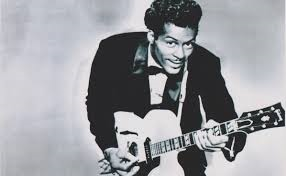Tell me:
Where would we be without Chuck Berry?
Just for starters:
1. We would not have rock and roll as we know it.
2. The Beatles would not be the Beatles.
3. The Rolling Stones would not be the Rolling Stones.
4. A great deal of popular music that has been loved these 60 years and more would never have been.
But most importantly, America and the world would have missed one of the most powerful, positive cultural forces we have seen.
And why do I, and many others, feel that?
I think it’s explained by this landmark principle of Aesthetic Realism stated by its founder Eli Siegel: “All beauty is a making one of opposites, and the making one of opposites is what we are going after in ourselves.”
I believe Chuck Berry’s music played a major role in the coming to be of rock and roll itself because of the way it puts opposites together—very importantly, the opposites of freedom and accuracy. Freedom has to be the same as accuracy, otherwise it’s not true freedom at all. Chuck Berry’s music is an everlastingly joyful celebration of freedom, and at its best it is always free and exact at once. We love it because it stands for how we want to be. We want to feel that being fair to, accurate about another person or thing is real freedom—the most authentic expression of our very selves.
When Chuck plays one of his exuberant guitar solos at the beginning or in the middle of a song, it always adheres to a very definite chord progression and is contained neatly within the solid rhythm laid down by the drums and band. Often, the rhythm used is “stop-time”—just one strong pulse on the first beat of each measure. As he plays, freedom is achieved not by ignoring these parameters, but by being beautifully faithful to them. And we are thrilled because we are hearing freedom and exactitude—also impediment and release—as one thing.
Then there are all the classic guitar licks, riffs and hooks that Berry uses to underlie and punctuate his songs, so many of which have become part of rock and roll’s DNA. Again and again, you hear his strong hands bending the steel strings of that guitar, and while you feel the stress, the resistance, the pressure, you also hear those glorious, triumphant notes come ringing forth—inevitable, unstoppable, clean.
In addition to the great guitar work, there is so much else to love in Berry’s music—including his often wonderful lyrics and the energetic, sometimes syncopated, sometimes streaming-staccato way he delivers them over the rhythm of the band, his voice conveying a twinkle in his eye—and again, that sense of joyful victory over obstacles.
Chuck Berry himself, with many troubles in his life, didn’t know that his music pointed the way for how he wanted to be, and I wish he could have.
But his legacy as an artist is very large.
Rock and Roll is here to stay, and as long as it stays it will bear his indelible mark.
The world owes him an enormous debt of gratitude, and I’m writing this to express some of mine.
Goodbye, dear Chuck Berry, and thank you!
Are you with me, readers? Let me know your thoughts in the comments.
And stay tuned for some upcoming posts with more about Chuck Berry, including his great 1964 record “Nadine.”
Rock on my friends,
– Kevin
